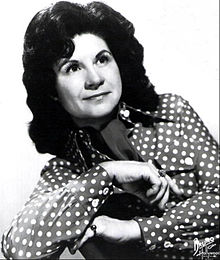Tennessee Mountain Boys
| Kitty Wells | |
|---|---|

1974 publicity shot of Kitty Wells
|
|
| Background information | |
| Birth name | Ellen Muriel Deason |
| Also known as | The Queen of Country Music; The Clock Stopper |
| Born |
August 30, 1919 Nashville, Tennessee, U.S. |
| Died | July 16, 2012 (aged 92) Madison, Tennessee |
| Genres | country, honky tonk, Nashville sound, gospel |
| Occupation(s) | Singer-songwriter |
| Instruments | Vocals, guitar |
| Years active | 1949–2000 |
| Labels | RCA Victor, Decca / MCA, Capricorn, Rubocca, Southern Tracks |
| Associated acts | Red Foley, Webb Pierce, Johnnie Wright, Ruby Wright, Loretta Lynn, Jean Stafford |
| Website | Kitty Wells official website; accessed September 10, 2014. |
Ellen Muriel Deason (August 30, 1919 – July 16, 2012), known professionally as Kitty Wells, was an American pioneering female country music singer. She broke down a female barrier in country music with her 1952 hit recording, "It Wasn't God Who Made Honky Tonk Angels" which also made her the first female country singer to top the U.S. country charts, and turned her into the first female country star. Her Top 10 hits continued until the mid-1960s, inspiring a long list of female country singers who came to prominence in the 1960s.
Wells ranks as the sixth-most successful female vocalist in the history of Billboard's country charts, according to historian Joel Whitburn's book The Top 40 Country Hits, behind Dolly Parton, Loretta Lynn, Reba McEntire, Tammy Wynette, and Tanya Tucker. In 1976, she was inducted into the Country Music Hall of Fame. In 1991, she became the third country music artist, after Roy Acuff and Hank Williams, and the eighth woman to receive the Grammy Lifetime Achievement Award. Her accomplishments earned her the nickname "Queen of Country Music".
Wells was born Ellen Muriel Deason on August 30, 1919, one of six siblings, to Charles Cary Deason and his wife, Myrtle, in Nashville, Tennessee. (She is one of the few well known country performers to have been born in Nashville.) She began singing as a child, learning guitar from her father, who was a brakeman on the Tennessee Central Railroad. Her father, Charles, and his brother were musicians and her mother, Myrtle, was a gospel singer. As a teenager, she sang with her sisters, who performed under the name the Deason Sisters on a local radio station beginning in 1936.
...
Wikipedia
